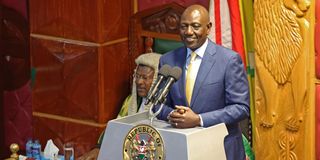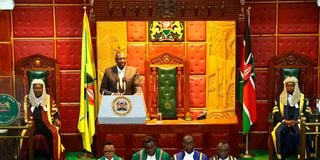Premium
Governing by excuses: President Ruto’s struggles with unfulfilled promises

President William Ruto speaking at Parliament on November 9, 2023, during the State of the Nation address.
What you need to know:
- Pundits say Ruto blames the Uhuru regime while at the same time walking in his footsteps.
- President William Ruto's administration is struggling to explain unfulfilled election campaign promises.
President William Ruto’s administration – which swept to power on promises of easing the cost of living – has found itself blaming international market forces and misgoverning by the previous regime for failure to implement some of its pledges.
Top government officials have in the recent past resorted to blaming forces beyond the one-year old administration’s control for the rising cost of living against their pre-election pledges.
Former President Uhuru Kenyatta has since emerged as a constant bogeyman for the failure by Kenya Kwanza administration to implement some of the lofty promises they made in the run up to the last general election.
High fuel prices in the international market, borrowing spree by the Jubilee administration, subsidies programmes by Mr Kenyatta and of late, the Israel - Palestine war, are some of the excuses they are citing for the current hard economic times.
Some top government officials have ended up contradicting themselves on the true position on some of the issues, like the cost of crude oil in the international market.
Impact of the government-to-government deal for supply of fuel has also become controversial as the shilling continues to weaken against the dollar, contrary to what the State had envisioned.
President Ruto in his State of the Nation address on Thursday blamed Mr Kenyatta for allegedly plunging the country into an “avoidable debt hole” by engaging in reckless borrowing.
“We must admit that as a country, we had been living large and way beyond our means. The time has come to retire the false comforts and illusory benefits of wasteful expenditure, and counterproductive subsidies on consumption by which we dug ourselves deeper into the hole of avoidable debt,”said Dr Ruto who served as the Deputy President during the 10-year Jubilee rule.
In February 2018, Dr Ruto defended the Jubilee government on its borrowing spree that by the time sunk the country into a Sh4.8 trillion debt.
“There’s been a lot of debate on the government’s borrowing. I want to assure Kenyans that before borrowing, the government made projections on what we need to spend on and our ability to pay that loan. I can reassure Kenyans that we want to initiate development projects that will spark economic growth in the country,” said then DP Ruto.
He made the remarks after the government had successfully issued the Euro Bond II at the London Stock Exchange.
The President’s economic advisor, Dr David Ndii, in a series of tweets, said there is no solution to the debt burden left by the previous administration, and that the taxpayers have to deal with the consequences since revenue being collected is channeled towards clearing the debts.
“So how have we paid our ways? No prices for guessing. Public debt. Eurobonds and syndicated loans. Up from zero when Uhuru took over to $10 billion today. Last year, just before the election, the government called off $1.1 billion Eurobond. That liquidity crunch is still biting,” said Dr Ndii.

President William Ruto addresses the 13th Parliament on September 29, 2022.
“A $2billion is due June 2024, the largest bond maturity in Africa next year. That is Uhuru’s legacy, whether you want to hear it or not. And there are no solutions, only consequences,” he tweeted.
He also said that the government-to-government deal in buying crude oil was not meant to stabilise the Kenyan shilling.
“Contrary to the noise about the slide despite the petroleum government-to-government, we did not set out to stabilise the foreign exchange market i.e availability of foreign exchange, restore the interbank market and clean the float. We have achieved the first, and good progress on two and three. Without government-to-government, we would be where Ghana is,” he posted on X platform (formerly Twitter).
Other government officials, including the President, had in April said the deal signed in March with Saudi Aramco, Abu Dhabi Oil Company (Adnoc) and Emirates National Oil Company (Enoc) to supply fuel to Kenya for a period of nine months with a six-month grace period, would help to stabilise the shilling.
“From this month of April, all our fuel marketers and other players in the space will be able to buy fuel products in Kenya shillings. This will remove pressure on the dollars. In fact, in the next one month or so, we will see the exchange coming down in a very phenomenal way. In my estimation, in the next couple of months, the exchange rate will come down to below Sh120, maybe Sh115, you never know,” said President Ruto.
On the high fuel prices, Energy Cabinet Secretary Davis Chirchir told the National Dialogue Committee early this week that the prices could go up as a result of the ongoing war between Israel and Palestine. He said the global market forces are beyond Kenya.
"We cannot do anything about the global pricing of petroleum which has soared from $70 per barrel to $80, and then to $90," CS Chirchir said. “The international prices of fuel could go up to $150. This would literally mean our petroleum prices could go up to Sh300 per litre at the pump. We hope it will not get there.” Petrol prices currently retail at Sh217.
Central Bank of Kenya (CBK) – a government institution, contradicted the position by the CS when it announced: “International oil prices declined during the week ending November 2, due to the dissipating impact of the war between Israel and Palestine. Murban oil price declined to $87.24 per barrel on November 2 from $90.23 on October 26.”
Prof David Monda, lecturer at City University of New York, said the President needs to show leadership and fix the economic mess instead of apportioning blame.





